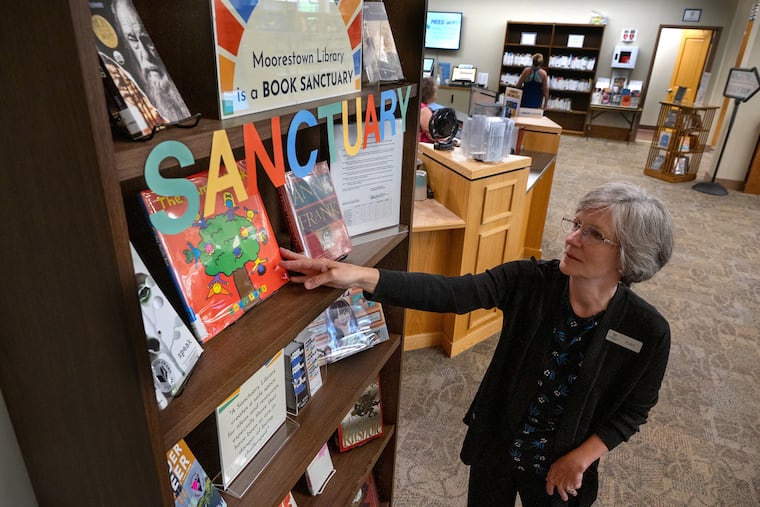In response to increasing attempts at book bans, Moorestown library becomes first ‘book sanctuary’ in South Jersey
The Burlington County library joins about three dozen book sanctuaries statewide, mostly in North Jersey where the movement began last year with Hoboken Public Library.

Tucked in an area just off the main entrance, a colorful display gives a new identity to the Moorestown Public Library: a book sanctuary.
The Burlington County library added that designation last month to make a statement about its values and opposition to growing book bans and challenges. It is believed to be the first South Jersey library to take such action.
“This is a town that reads a lot and really values their library and their right to read,” said library director Joan Serpico. “This is our way of saying ‘We’ve got your back.’”
Moorestown joins about three dozen book sanctuaries statewide, mostly in North Jersey where the movement began last year with Hoboken Public Library. Since Moorestown made the move, the Pennsauken Free Library also became a book sanctuary, and a vote is expected later this month by Mount Laurel’s trustee board designating its public library a sanctuary.
In recent years, there have been growing efforts to restrict books in public libraries and schools by those contending restrictions are necessary to protect children from reading some materials without parental guidance. They have frequently targeted books about race, racism, gender, or sexuality. But a 2022 poll by free-speech group PEN America found that 70% of parents oppose book bans.
Utah this month ordered schools to remove 13 books from classrooms and libraries because they have content considered pornographic or indecent under a new state law. Individual books must be removed statewide if a total of three public school districts, or two districts and five additional charter schools, have chosen to remove them.
In 2023, there were 1,247 demands to censor library books and resources nationwide, up 65% from the year before, according to the American Library Association’s Office for Intellectual Freedom.
Serpico said there have not been any recent book challenges in Moorestown, a community of about 21,000. The library decided to become a sanctuary to declare it a safe space and protect books from challenges, especially from outside groups, she said.
The sanctuary display includes a variety of frequently challenged or banned books for patrons to check out. They include J.D. Salinger’s A Catcher in the Rye, Toni Morrison’s The Bluest Eye, and The Diary of a Young Girl by Anne Frank.
“We’re very proud that our library has chosen to do this,” said Mayor Nicole Gillespie. “It is a gem in our town.”
The library’s board of trustees voted 8-0 to endorse the sanctuary resolution, said Joan Bernstein, the trustee who made the motion. The resolution, in part, opposes censorship and promotes “free and respectful expression of differing viewpoints.”
“It just is concerning to me that there are people who think they know what everyone else should read,” said Bernstein, a retired librarian. “Who are they to dictate what other people should read? That’s the thing I find most insulting.”
On a mission to protect books
Ever since Hoboken became a sanctuary last year, director Jennie Pu has been on a mission to get the state’s nearly 300 public libraries to join the campaign.
“It’s really a statement that we don’t ban books,” said Pu, a former school librarian. “We are a place where we will protect the First Amendment. It is an unprecedented attack on our civil liberties.”
Pu, cochair of New Jersey Library Association’s public policy committee, is also pushing a measure pending in the state Legislature that would require policies on the curation of library materials in public school libraries, as well as establish a procedure regarding requests for removal. The Freedom to Read Act would also protect library and school staff who have come under attack during book challenges.
» READ MORE: Why I teach Black history through graphic novels
Serpico noted that Moorestown patrons who object to a book can make their concerns known by filing a reconsideration form to have the material removed or moved to a different section. The library will then decide on the request, she said.
The requester must be a cardholder — a change in previous policy that allowed outsiders to make objections, Serpico said. The library has about 7,000 active patrons, she said.
“It’s the community’s library,” Serpico said. “People still have the right to express concern.”
Lauren Stolzer, a Moorestown elementary school technology teacher, was surprised to learn about the sanctuary designation and said she was “all for it.”
“I love how there is a space that is needed to grow and learn,” said Stolzer. “Books are how we experience things outside of where we live.”
Pennsauken Library director Tanya Finney Estrada said the sanctuary resolution cleared her trustee board without debate. The library has not had any serious book challenges, she said. A campaign to promote awareness for the sanctuary will be held in September during Banned Books Week.
“Book banning has become an increasing issue,” said Finney Estrada. “We really have to pay attention.”